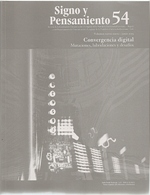Abstract
Book review: Scolari, Carlos. 2008. Hipermediaciones. Elementos para una Teoría de la Comunicación Digital Interactiva. Barcelona: Editorial Gedisa, S.A. ISBN 978-84-9784-273-0.
The researcher of the Department of Digital Communication, University of Vic (Catalonia) and director of the Digital Research Group (GRD), Carlos Scolari, author, among other works, of: "Clicking: towards a semiotic partner of Digital interactions "(2004), offers us with:" Hypermediations. Elements for a Theory of Interactive Digital Communication "(2008), the most recent of its productions where, as an essay, it delimits a new theoretical territory focused on the digital communication ecosystem. In the text Scolari, from a 'semiotic look and with a transversal and multimodal spirit', he makes an analysis of the new theory on interactive digital communication. The author condenses into three parts: Communication knowledge - Communication making - Hypermediations, a set of scientific conversations about this contemporary phenomenon: interactive digital communication.
This journal is registered under a Creative Commons Attribution 4.0 International Public License. Thus, this work may be reproduced, distributed, and publicly shared in digital format, as long as the names of the authors and Pontificia Universidad Javeriana are acknowledged. Others are allowed to quote, adapt, transform, auto-archive, republish, and create based on this material, for any purpose (even commercial ones), provided the authorship is duly acknowledged, a link to the original work is provided, and it is specified if changes have been made. Pontificia Universidad Javeriana does not hold the rights of published works and the authors are solely responsible for the contents of their works; they keep the moral, intellectual, privacy, and publicity rights.
Approving the intervention of the work (review, copy-editing, translation, layout) and the following outreach, are granted through an use license and not through an assignment of rights. This means the journal and Pontificia Universidad Javeriana cannot be held responsible for any ethical malpractice by the authors. As a consequence of the protection granted by the use license, the journal is not required to publish recantations or modify information already published, unless the errata stems from the editorial management process. Publishing contents in this journal does not generate royalties for contributors.


